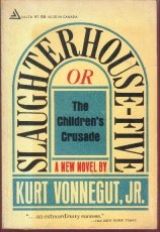
by Kurt Vonnegut
about World War II
experiences and journeys through time
of a soldier called Billy Pilgrim
. The novel is widely regarded as among the most significant works of 20th century literature, and is generally recognized as Vonnegut's most influential and popular work.
Some editions of the novel give the title as Slaughterhouse-Five, or The Children’s Crusade: A Duty Dance with Death.
This is a novel somewhat in the telegraphic schizophrenic manner of tales of the planet Tralfamadore|Tralfamadore, where the flying saucers come from. Peace.![]()
So it goes.![]()
The smell of mustard gas and roses.![]()
It is so short and jumbled and jangled, Sam, because there is nothing intelligent to say about a massacre. Everybody is supposed to be dead, to never say anything or want anything ever again. Everything is supposed to be very quiet after a massacre, and it always is, except for the birds.And what do the birds say? All there is to say about a massacre, things like "Poo-tee-weet?"(19,24)![]()
I have told my sons that they are not under any circumstances to take part in massacres, and that the news of massacres of enemies is not to fill them with satisfaction or glee.![]()
I have also told them not to work for companies which make massacre machinery, and to express contempt for people who think we need machinery like that.
![]()
Listen: Billy Pilgrim has come unstuck in time.
![]()

